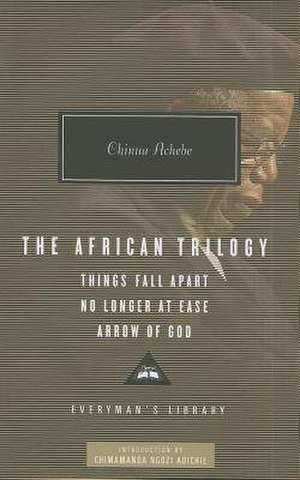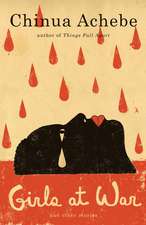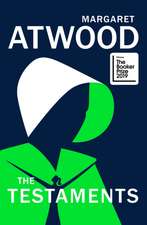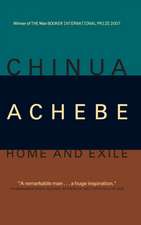The African Trilogy: Things Fall Apart No Longer at Ease Arrow of God: Everyman's Library CLASSICS
Autor Chinua Achebeen Limba Engleză Hardback – mar 2010
Chinua Achebe is considered the father of African literature in English, the writer who 'opened the magic casements of African fiction' for an international readership. Following the 50th anniversary of the publication of his ground-breaking Things Fall Apart, Everyman republish Achebe's first and most famous novel alongside No Longer at Ease and Arrow of God, under the collective title The African Trilogy.
In Things Fall Apart the individual tragedy of Okonkwo, 'strong man' and tribal elder in the Nigeria of the 1890s is intertwined with the transformation of traditional Igbo society under the impact of Christianity and colonialism. In No Longer at Ease, Okonkwo's grandson, Obi, educated in England, returns to a civil-service job in colonial Lagos, only to clash with the ruling elite to which he now believes he belongs. Arrow of God is set in the 1920s and explores the conflict from the two points of view - often, but not always, opposing - ofEzuelu, an Igbo priest, and Captain Winterbottom, a British district officer.
In spare and lucid prose,Achebe tellsa universal tale of personal and moral struggle in a changing world which continues to resonate in Africa today and has captured the imaginations of readers everywhere.
| Toate formatele și edițiile | Preț | Express |
|---|---|---|
| Hardback (2) | 109.11 lei 26-32 zile | +42.68 lei 7-13 zile |
| Random House – mar 2010 | 109.11 lei 26-32 zile | +42.68 lei 7-13 zile |
| Everyman's Library – 31 dec 2009 | 180.40 lei 3-5 săpt. |
Din seria Everyman's Library CLASSICS
- 13%
 Preț: 366.37 lei
Preț: 366.37 lei - 14%
 Preț: 73.47 lei
Preț: 73.47 lei - 14%
 Preț: 84.70 lei
Preț: 84.70 lei - 11%
 Preț: 90.41 lei
Preț: 90.41 lei - 12%
 Preț: 76.74 lei
Preț: 76.74 lei - 13%
 Preț: 63.36 lei
Preț: 63.36 lei - 11%
 Preț: 112.93 lei
Preț: 112.93 lei - 12%
 Preț: 88.02 lei
Preț: 88.02 lei -
 Preț: 84.44 lei
Preț: 84.44 lei - 17%
 Preț: 110.12 lei
Preț: 110.12 lei - 12%
 Preț: 87.77 lei
Preț: 87.77 lei - 12%
 Preț: 76.62 lei
Preț: 76.62 lei - 13%
 Preț: 115.40 lei
Preț: 115.40 lei - 11%
 Preț: 89.81 lei
Preț: 89.81 lei - 12%
 Preț: 104.38 lei
Preț: 104.38 lei - 13%
 Preț: 62.73 lei
Preț: 62.73 lei - 11%
 Preț: 90.22 lei
Preț: 90.22 lei - 12%
 Preț: 76.82 lei
Preț: 76.82 lei - 13%
 Preț: 114.51 lei
Preț: 114.51 lei - 13%
 Preț: 86.26 lei
Preț: 86.26 lei - 13%
 Preț: 74.80 lei
Preț: 74.80 lei - 14%
 Preț: 60.89 lei
Preț: 60.89 lei - 25%
 Preț: 158.17 lei
Preț: 158.17 lei - 14%
 Preț: 90.21 lei
Preț: 90.21 lei - 14%
 Preț: 83.48 lei
Preț: 83.48 lei - 12%
 Preț: 75.39 lei
Preț: 75.39 lei - 23%
 Preț: 102.65 lei
Preț: 102.65 lei - 12%
 Preț: 81.12 lei
Preț: 81.12 lei - 13%
 Preț: 74.90 lei
Preț: 74.90 lei - 13%
 Preț: 85.11 lei
Preț: 85.11 lei - 13%
 Preț: 97.36 lei
Preț: 97.36 lei - 12%
 Preț: 75.81 lei
Preț: 75.81 lei - 11%
 Preț: 90.25 lei
Preț: 90.25 lei - 12%
 Preț: 118.20 lei
Preț: 118.20 lei - 11%
 Preț: 89.68 lei
Preț: 89.68 lei - 14%
 Preț: 62.03 lei
Preț: 62.03 lei - 14%
 Preț: 83.79 lei
Preț: 83.79 lei - 12%
 Preț: 111.39 lei
Preț: 111.39 lei - 12%
 Preț: 92.90 lei
Preț: 92.90 lei - 13%
 Preț: 74.71 lei
Preț: 74.71 lei - 13%
 Preț: 73.59 lei
Preț: 73.59 lei - 13%
 Preț: 79.64 lei
Preț: 79.64 lei -
 Preț: 109.75 lei
Preț: 109.75 lei - 13%
 Preț: 68.30 lei
Preț: 68.30 lei - 14%
 Preț: 89.69 lei
Preț: 89.69 lei - 9%
 Preț: 94.86 lei
Preț: 94.86 lei - 15%
 Preț: 110.11 lei
Preț: 110.11 lei - 13%
 Preț: 74.61 lei
Preț: 74.61 lei - 12%
 Preț: 87.10 lei
Preț: 87.10 lei - 14%
 Preț: 73.53 lei
Preț: 73.53 lei
Preț: 109.11 lei
Preț vechi: 128.52 lei
-15% Nou
20.88€ • 21.80$ • 17.28£
Carte disponibilă
Livrare economică 20-26 martie
Livrare express 01-07 martie pentru 52.67 lei
Specificații
ISBN-10: 1841593273
Pagini: 513
Dimensiuni: 136 x 211 x 37 mm
Greutate: 0.57 kg
Editura: Random House
Colecția Everyman's Library
Seria Everyman's Library CLASSICS
Notă biografică
Extras
BY CHIMAMANDA NGOZI ADICHIE
——
When, in 1958, the London publishers William Heinemann received a manuscript of Chinua Achebe’s Things Fall Apart, they were unsure whether to publish it. The central question, according to editor Alan Hill, was this: ‘Would anyone possibly buy a novel by an African?’ Not only were there a mere handful of examples of African writing in English at the time ߝ such as Amos Tutuola’s surreal The Palm-Wine Drinkard and Cyprian Ekwensi’s novel of contemporary Lagos, People of the City ߝ but none of them had the ambition, the subtlety, or the confidence of Things Fall Apart.
Chinua Achebe had initially conceived it as a story of three generations: a man in pre-colonial Igboland who struggles against the changes brought by the first European missionaries and administrators; his son who converts to Christianity and receives some Western education; and his grandson who is educated in England and is living the life of the new elite on the cusp of independence. Achebe later scaled down the novel, focusing only on the first generation, to produce a carefully observed story of the African European colonial encounter set among the Igbo people of south-eastern Nigeria in the 1890s, with the tragic hero Okonkwo at its center. Achebe’s second novel, No Longer at Ease, would skip a generation and tell the story of Okonkwo’s grandson, Obi, a civil servant in 1950s Lagos. His third novel, Arrow of God, about an Igbo priest and a British district officer in 1920s Igboland, can be read as representative of the times of Okonkwo’s son. All three novels, taken together as Achebe’s ‘African Trilogy’, create a full and beautifully nuanced arc, a human chronicle of the cultural and political changes that brought about what is now seen as the modern African state.
After William Heinemann overcame their reservations and published Things Fall Apart in June 1958, it became a critical success. Achebe, the Times Literary Supplement wrote, had ‘genuinely succeeded in presenting tribal life from the inside.’ A novelty indeed. Things Fall Apart was pioneering not in its subject but in its African point of view, as there were already many well-regarded books about Africans written by non-Africans; tribal life had already been endlessly portrayed from the outside. Achebe himself first read some of the better-known examples of these ‘colonialism classics’ as a secondary-school student in the 1940s. ‘I did not see myself as an African to begin with,’ he has written about his response to the African characters. ‘I took sides with the white men against the savages. The white man was good and reasonable and intelligent and courageous. The savages arrayed against him were sinister and stupid or, at the most, cunning. I hated their guts.’ As Achebe matured and became more critical in his reading, he began to understand the enormous power that stories had, and how much this power was shaped by who told the stories and by how they were told. As a university student in the 1950s, in addition to reading Wordsworth, Shakespeare and Coleridge, Achebe also read Joyce Cary’s Mister Johnson, a novel set in Nigeria, which Time magazine had named the ‘best book ever written about Africa.’ Achebe disagreed. Not only was the Nigerian character in the novel unrecognizable to him and his classmates but he also detected, in the description of Nigerians, ‘an undertow of uncharitableness . . . a contagion of distaste, hatred and mockery.’
There has been much written about Chinua Achebe’s Things Fall Apart as a response to Mister Johnson, and one likes to think that Achebe would have written his novel even if he had not read Cary’s. Still, the prejudiced representation of African characters in literature could not but have had an influence on Achebe’s development as a writer. He would, years later, write a famous essay about the portrayal of Africans in Joseph Conrad’s classic novel Heart of Darkness, arguing that while Conrad had written honestly about the racism of the time, he had failed to hold an authorial rejection of that world-view. The strangeness of seeing oneself distorted in literature ߝ and indeed of not seeing oneself at all ߝ was part of my own childhood. I grew up in the Nigerian university town of Nsukka in the 1980s, reading a lot of British children’s books. My early writing mimicked the books I was reading: all my characters were white and all my stories were set in England. Then I read Things Fall Apart. It was a glorious shock of discovery, as was Arrow of God, which I read shortly afterwards; I did not know in a concrete way until then that people like me could exist in literature. Here was a book that was unapologetically African, that was achingly familiar, but that was, also, exotic because it detailed the life of my people a hundred years before. Because I was educated in a Nigerian system that taught me little of my pre-colonial past, because I could not, for example, imagine with any accuracy how life had been organized in my part of the world in 1890, Achebe’s novels became strangely personal. Things Fall Apart was no longer a novel about a man whose exaggerated masculinity and encompassing fear of weakness make it impossible for him to adapt to the changes in his society, it became the life my great-grandfather might have lived. Arrow of God was no longer just about the British administration’s creation of warrant chiefs, and the linked destinies of two men ߝ one an Igbo priest, the other a British administrator; it became the story of my ancestral hometown during my grandfather’s time. And No Longer at Ease transcended the story of an educated young Nigerian struggling with the pressure of new urban expectations in Lagos, and became the story of my father’s generation.
















